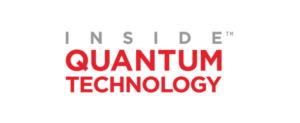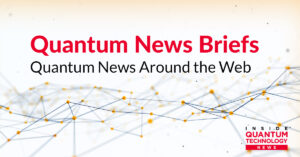By Sandra Helsel posted 19 Sep 2022
Quantum News Briefs September 18 begins with Biden administration’s instructions to US Treasury’s Committee on Foreign Investment to more closely vet transactions that could limit US leadership in quantum computing followed by Rigetti’s Inaugural Investor Day announcements of new Partnerships and business updates. Third is news from Toshiba that its Double-newly announced Transmon Coupler will realize faster, more accurate superconducting quantum computers. And MORE from NSF.
Biden instructs Committee on Foreign Investment to vet transactions on quantum computing and biotechnology
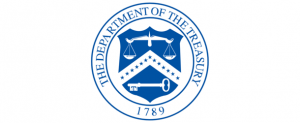 President Biden has instructed the U.S. Treasury’s Committee on Foreign Investment in the United States (CFIUS) to more closely vet transactions that could impact U.S. leadership in quantum computing and biotechnology, according to senior administration officials briefing reporters on the move. Quantum News Briefs summarizes recent reporting by Alexandra Alper and Steve Holland at Reuters.
President Biden has instructed the U.S. Treasury’s Committee on Foreign Investment in the United States (CFIUS) to more closely vet transactions that could impact U.S. leadership in quantum computing and biotechnology, according to senior administration officials briefing reporters on the move. Quantum News Briefs summarizes recent reporting by Alexandra Alper and Steve Holland at Reuters.
“The executive order will help guide the committee and should also help businesses and investors better identify early on national security risks arising from transactions to help them determine whether to file with CFIUS,” one of the officials said.
U.S. companies making deals with foreign entities are required to file with the agency if they meet certain criteria.
The official stressed that CFIUS has already been considering these kinds of risks and has taken action to address them in the past. CFIUS has become a powerful tool to stymie Chinese investment in critical sectors in the United States.
Officials said the new executive order was not specifically aimed at China. “Neither this order nor CFIUS as a general matter is country specific (or) is country focused. What the committee does is look at transactions on a transaction by transaction basis to assess national security risks,” one official said.
*****
Rigetti announced new Partnerships, provided business updates at Inaugural Investor Day
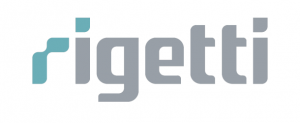 Rigetti Computing, Inc. (“Rigetti” or the “Company”) (Nasdaq: RGTI), a pioneer in hybrid quantum-classical computing, will shared business developments, including updates regarding its partnerships, Fab-1 facility, and status of its technology roadmap, ahead of its previously announced inaugural investor day on September 16. Quantum News Briefs summarizes the partnership announcements below. Watch IQT News for Dan O’Shea’s upcoming, in-depth coverage of Rigetti’s recent financial and partner announcements.
Rigetti Computing, Inc. (“Rigetti” or the “Company”) (Nasdaq: RGTI), a pioneer in hybrid quantum-classical computing, will shared business developments, including updates regarding its partnerships, Fab-1 facility, and status of its technology roadmap, ahead of its previously announced inaugural investor day on September 16. Quantum News Briefs summarizes the partnership announcements below. Watch IQT News for Dan O’Shea’s upcoming, in-depth coverage of Rigetti’s recent financial and partner announcements.
Chad Rigetti, founder and CEO of the Company. “We are making strategic investments in quantum hardware, software, and partnerships that we believe will enable us to progress toward Quantum Advantage. “In addition, we’re excited to announce several key partnerships,” Rigetti continued. “These include a partnership with Bluefors to develop new modular dilution fridges to support our planned 336Q, 1,000+ qubit, and 4,000+ qubit quantum processing units. Earlier this week, we announced the public preview of our current 80Q Aspen-M-2 and 40Q Aspen-11 systems on Microsoft’s Azure Quantum. Rigetti quantum computers are now available on the world’s two largest public cloud platforms.”
Partnership information:
Keysight True-Q Error Mitigation Tools on Rigetti Quantum Cloud Services (QCS™)
Rigetti anticipates the upcoming release of Keysight’s True-Q error mitigation software integrated into Rigetti QCS in the coming months.
Collaboration with NVIDIA to Develop Hybrid GPU-QPU Workflow for Climate Modeling
Rigetti is embarking on a new collaboration with NVIDIA to develop a hybrid GPU-QPU workflow for climate modeling applications.
Public Preview of Rigetti Quantum Processors on Microsoft Azure Quantum
Earlier, Rigetti announced the release of its Aspen-M-2 80-qubit and Aspen-11 40-qubit in public preview on Azure Quantum.
*****
NSF announces increased support for capacity building in quantum information science and engineering research
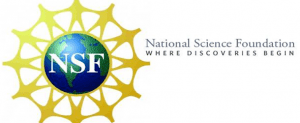 NSF recently hosted government officials across 15 different federal departments and agencies in observance of Quantum Information Science Program Days. Opening remarks reflected NSF’s longstanding support for quantum information science and engineering and commitment to cross-agency collaboration. Opening remarks reflected NSF’s longstanding support for quantum information science and engineering and commitment to cross-agency collaboration.
NSF recently hosted government officials across 15 different federal departments and agencies in observance of Quantum Information Science Program Days. Opening remarks reflected NSF’s longstanding support for quantum information science and engineering and commitment to cross-agency collaboration. Opening remarks reflected NSF’s longstanding support for quantum information science and engineering and commitment to cross-agency collaboration.
The expansive and growing societal and economic impacts of quantum information science and engineering, or QISE, pose new challenges and unique possibilities. Building capacity, broadening participation, increasing access and expanding opportunities are central to fulfilling the mandate outlined in the “National Quantum Initiative Act,” passed in 2018, and a key tenet of the U.S. National Science Foundation’s founding mission to advance scientific leadership and support research that breaks through barriers.
The NSF Expanding Capacity in Quantum Information Science and Engineering program supports work in quantum fundamentals; metrology and control; co-design and systems; and education and workforce development. NSF invested $21,397,566 in 2022 ExpandQISE awards.
The 2022 ExpandQISE awardees will participate in research that covers a broad spectrum of disciplines, including physics, computer science, materials research, engineering and chemistry. Awardees represent a diverse pool of institutions, including three historically Black colleges and universities.
The ExpandQISE program builds capacity by providing support and resources for QISE-related research at all educational levels. Each team participates in impactful activities that bolster QISE education and workforce development.
Learn more about the ExpandQISE program and visit nsf.gov.
*****
Toshiba’s Double-Transmon Coupler will realize faster, more accurate superconducting quantum computers
 Researchers at Toshiba Corporation have achieved a breakthrough in quantum computer architecture: the basic design for a double-transmon coupler that will improve the speed and accuracy of quantum computation in tunable couplers. Quantum News Briefs summarizes. The original and complete announcement can be viewed here.
Researchers at Toshiba Corporation have achieved a breakthrough in quantum computer architecture: the basic design for a double-transmon coupler that will improve the speed and accuracy of quantum computation in tunable couplers. Quantum News Briefs summarizes. The original and complete announcement can be viewed here.
The coupler is a key device in determining the performance of superconducting quantum computers.
Toshiba’s double-transmon coupler can be applied to fixed-frequency transmon qubits, realizing high stability and ease of design. It is the first to realize coupling between fixed-frequency transmon qubits with significantly different frequencies that can be completely switched on and off, and to deliver a high-speed, accurate two-qubit gate*.
Tunable couplers in a superconducting quantum computer link two qubits and perform quantum computations by turning on and off the coupling between them. Current technology can turn off the coupling of transmon qubits with close frequencies, but this is prone to crosstalk errors that occur on one of the qubits when the other qubit is irradiated with electromagnetic waves for control. In addition, current technology cannot completely turn off coupling for qubits with significantly different frequencies, resulting in errors due to residual coupling.
Toshiba plans to start to prototype and demonstrate the double-transmon coupler this fiscal year. The Company aims to make use of its characteristics to achieve the world’s highest level performance in both speed and accuracy.
*****
Quantum magnet is 3 billion times colder than interstellar space, scientists discover
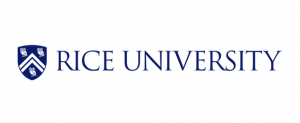 Japanese and U.S. physicists have used atoms about 3 billion times colder than interstellar space to open a portal to an unexplored realm of quantum magnetism. This discovery could help scientists build high-temperature superconductors or insulators. Quantum News Briefs summarizes coverage by Fabienne Lang in Interesting Engineering.
Japanese and U.S. physicists have used atoms about 3 billion times colder than interstellar space to open a portal to an unexplored realm of quantum magnetism. This discovery could help scientists build high-temperature superconductors or insulators. Quantum News Briefs summarizes coverage by Fabienne Lang in Interesting Engineering.
“The thermometer they use in Kyoto is one of the important things provided by our theory,” said Hazzard, associate professor of physics and astronomy and a member of the Rice Quantum Initiative. “Comparing their measurements to our calculations, we can determine the temperature. The record-setting temperature is achieved thanks to fun new physics that has to do with the very high symmetry of the system.”
“Unless an alien civilization is doing experiments like these right now, anytime this experiment is running at Kyoto University it is making the coldest fermions in the universe,” said Rice University’s Kaden Hazzard, corresponding theory author of a study published in Nature Physics. “ Fermions are not rare particles. They include things like electrons and are one of two types of particles that all matter is made of.”
Takahashi’s lab used optical lattices to simulate a Hubbard model, an oft-used quantum model created in 1963 by theoretical physicist John Hubbard. Physicists use Hubbard models to investigate the magnetic and superconducting behavior of materials, especially those where interactions between electrons produce collective behavior, somewhat like the collective interactions of cheering sports fans who perform “the wave” in crowded stadiums.
*****


